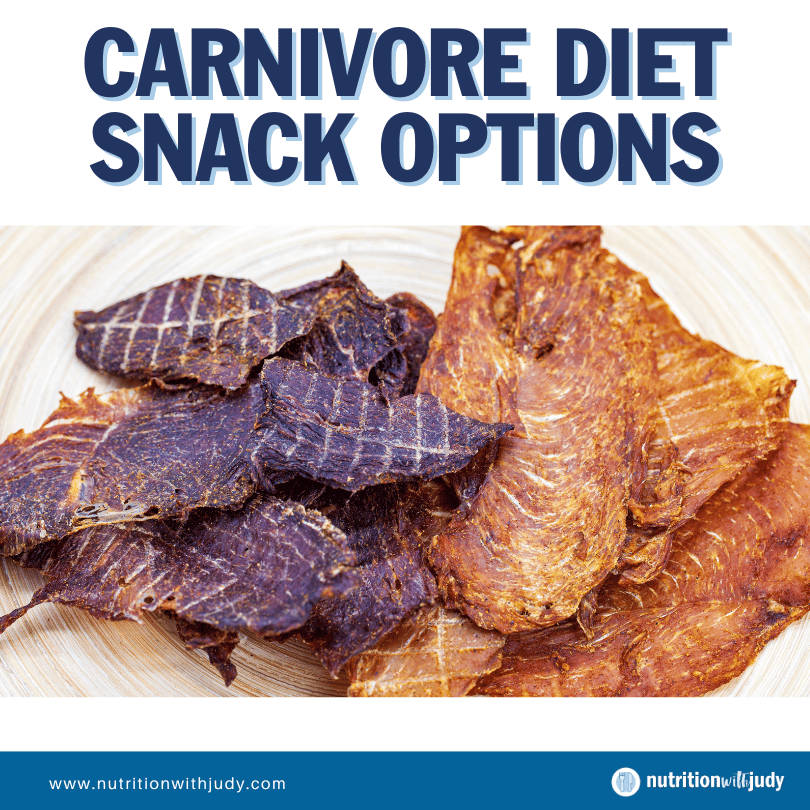

Carnivore Diet Snack Options


Welcome to our guide on carnivore diet snack options! Embracing the carnivore diet means focusing on meat-based foods, which often raises the question: what about snacks? Snacks play a crucial role in maintaining consistency and staying on track with any diet, including the carnivore diet.
While many people report improved satiety and often find themselves eating fewer meals and even fewer snacks with this way of eating, planning ahead and having the right snack options available, you can avoid moments of hunger or temptation that might lead you astray from your dietary goals.
Remember, the key to success with the carnivore diet, or any diet, lies in preparedness and the right choices – even when it comes to snacks.
What Is the Carnivore Diet?
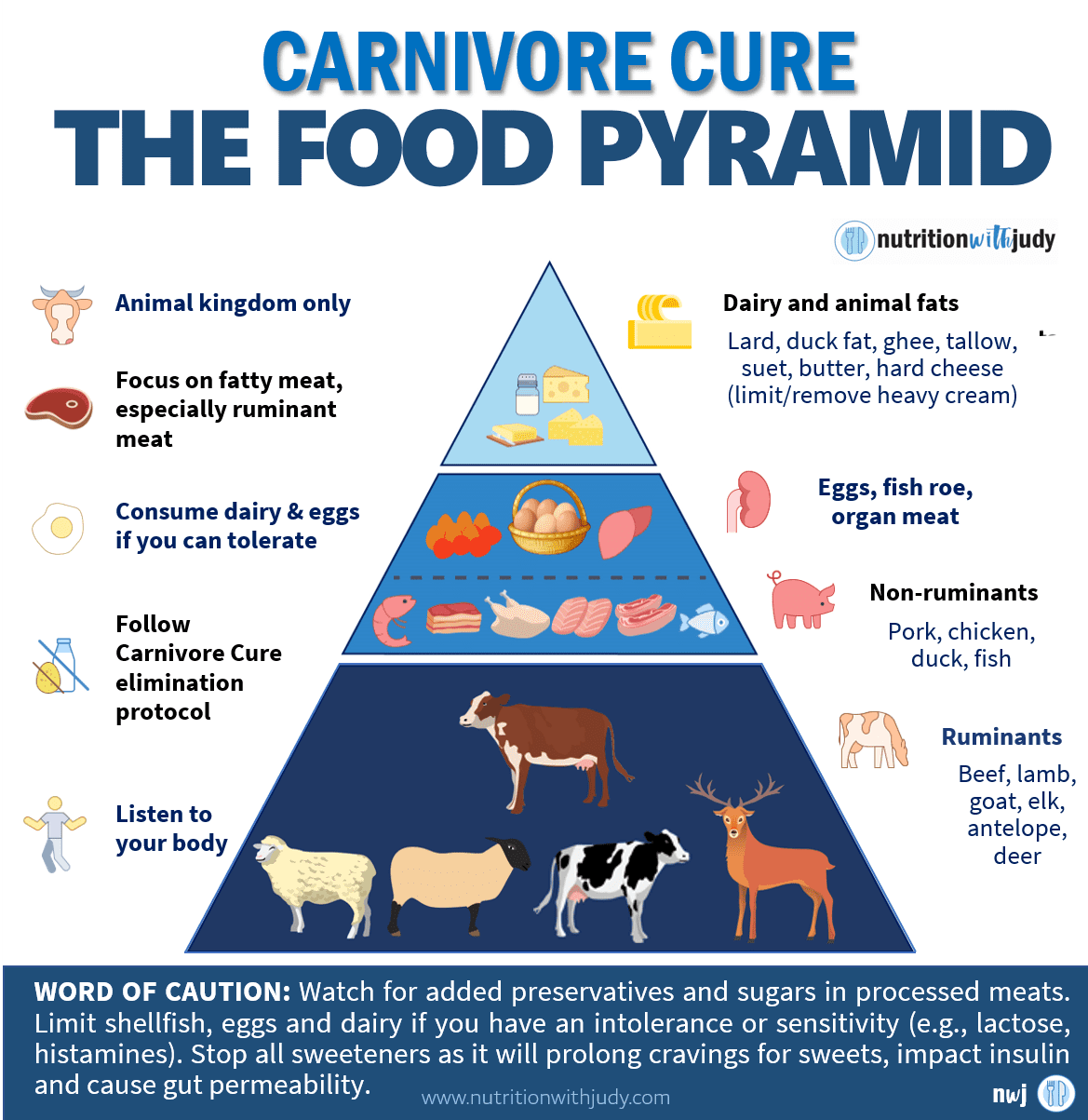

The carnivore diet, centered around animal-based foods, presents several tailored variations to meet individual health goals and needs. Let’s explore these unique versions:
- Beef-Only Carnivore Diet: This diet focuses exclusively on beef, renowned for its simplicity and effectiveness, particularly in elimination diets. It’s an ideal starting point for individuals dealing with autoimmune or chronic health issues. However, for long-term sustainability and nutritional balance, it’s advisable to include a variety of meats.
- Lion Diet: A more stringent version, the Lion Diet restricts intake to ruminant meats, salt, and water. Typically used in elimination protocols, it allows for the gradual reintroduction of other meats. This diet is particularly beneficial for individuals focusing on autoimmune and gut health.
- Nose-to-Tail Carnivore Diet: Advocating the consumption of all animal parts, including organ meats, this diet aims for a comprehensive nutrient profile. However, caution is advised with liver and kidney intake, especially for those with specific liver conditions, to prevent nutrient imbalances such as vitamin A toxicity.
- Meat-Only Carnivore Diet: This variation includes all muscle meats from the animal kingdom, excluding organ meats, dairy, and eggs. It suits those seeking a foundational elimination diet and who tolerate muscle meat well.
- Zero-Carb Carnivore Diet: Prioritizing foods with minimal to no carbohydrates, this diet encompasses dairy, eggs, and all types of meat, focusing primarily on meat and animal fats. Seasonings may be included. It’s a good fit for individuals without autoimmune or chronic health issues who tolerate dairy and eggs.
- Carnivore Keto Diet: Combining ketogenic diet principles with carnivore diet guidelines, this low-carb, high-fat approach simulates fasting effects while offering dietary variety. Foods such as avocados and coconut oil, considered low in plant anti-nutrients, are included. This diet is suited for metabolically healthy individuals who have resolved most chronic health issues.
- Carnivore-Ish Keto Diet: Offering more flexibility, this variation blends additional ketogenic elements while focusing on animal-based foods. It may include alternative keto sweeteners, some nut products, and other keto-friendly foods, remaining predominantly meat-based. Recommended for metabolically healthy individuals without food addiction issues.
- Animal-Based Diet: A more inclusive version, this diet centers on animal products but permits fruits, honey, and raw dairy. It has shown positive results in metabolically flexible individuals and elite athletes. We typically don’t recommend this diet variation due to the risks of mixing sugar and high fat in the diet.
Each variation of the carnivore diet offers distinct benefits and considerations, catering to diverse health objectives and dietary preferences.
What Are the Benefits of the Carnivore Diet?
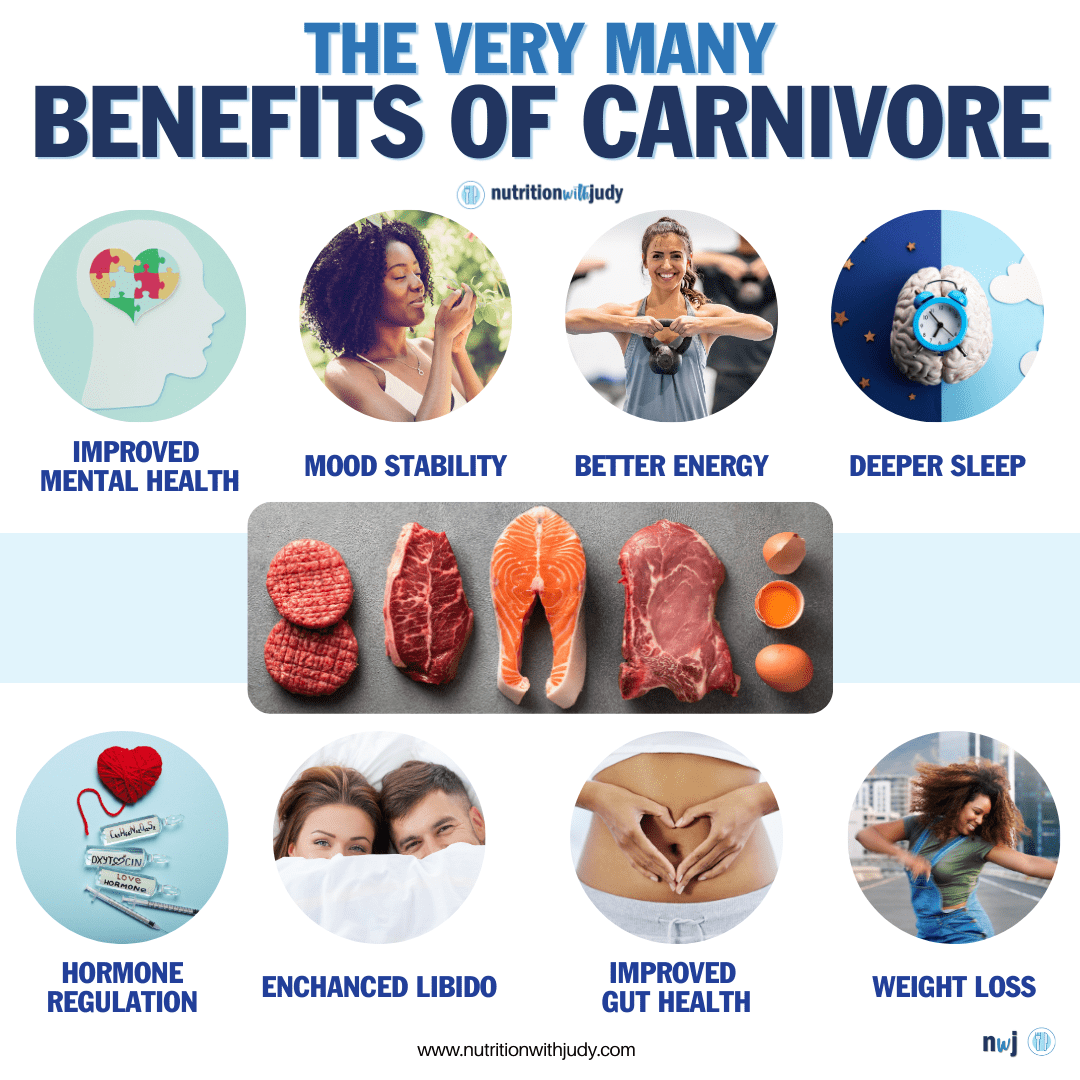

The carnivore diet, a regimen focused on consuming animal-based foods, has garnered significant attention for its range of health benefits. This comprehensive explanation explores the various reasons individuals might opt for this dietary approach.
- Mental Health Benefits: Many individuals have reported remarkable improvements in mental health conditions such as depression and anxiety after adopting the carnivore diet. This diet has not only helped people manage these conditions without relying on medication but has also freed them from the love-hate relationship with food.
- Autoimmune and Chronic Illness Relief: The carnivore diet has shown effectiveness in alleviating symptoms of various autoimmune disorders. People have experienced more mobility and reduced pain, indicating the diet’s potential to address chronic illnesses.
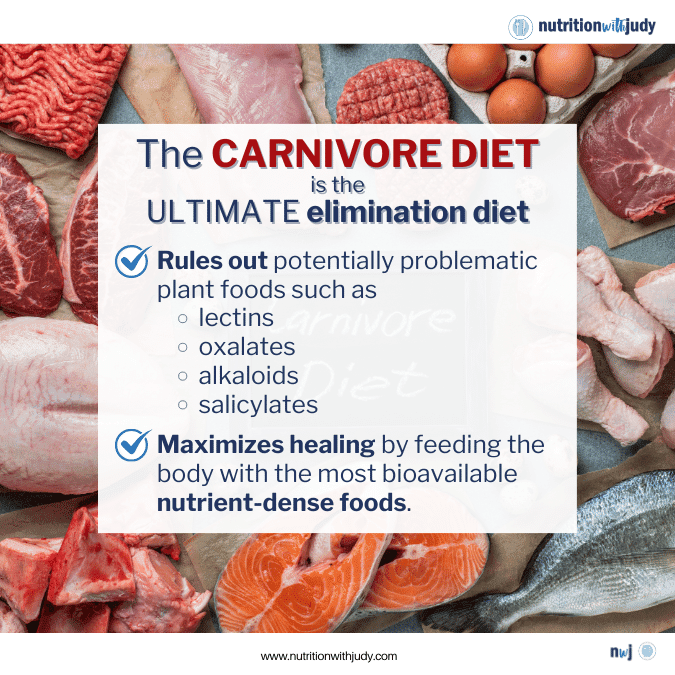

- Identification of Food Sensitivities: The carnivore diet acts as an elimination diet, helping individuals identify food sensitivities. By eliminating common allergens and irritants found in plant-based foods, this diet simplifies the process of pinpointing dietary triggers.
- Nutritional Sufficiency: Contrary to concerns about nutritional deficiencies, the carnivore diet provides a bioavailable and nutrient-dense source of essential nutrients. It focuses on whole foods, particularly meats, which contain a balance of vitamins, minerals, and other nutrients crucial for health.
- Weight Management: While weight gain or loss is not the primary focus of the carnivore diet, many have found it beneficial for maintaining a healthy weight. It’s important to note, however, that individual experiences may vary, and various health and lifestyle factors can impact your results.
- Support for Metabolic Health: The diet has been particularly beneficial for those with metabolic diseases such as type 2 diabetes and high blood pressure. By focusing on meat consumption and eliminating carbohydrate-rich foods, individuals have seen improvements in blood sugar levels and overall metabolic health.
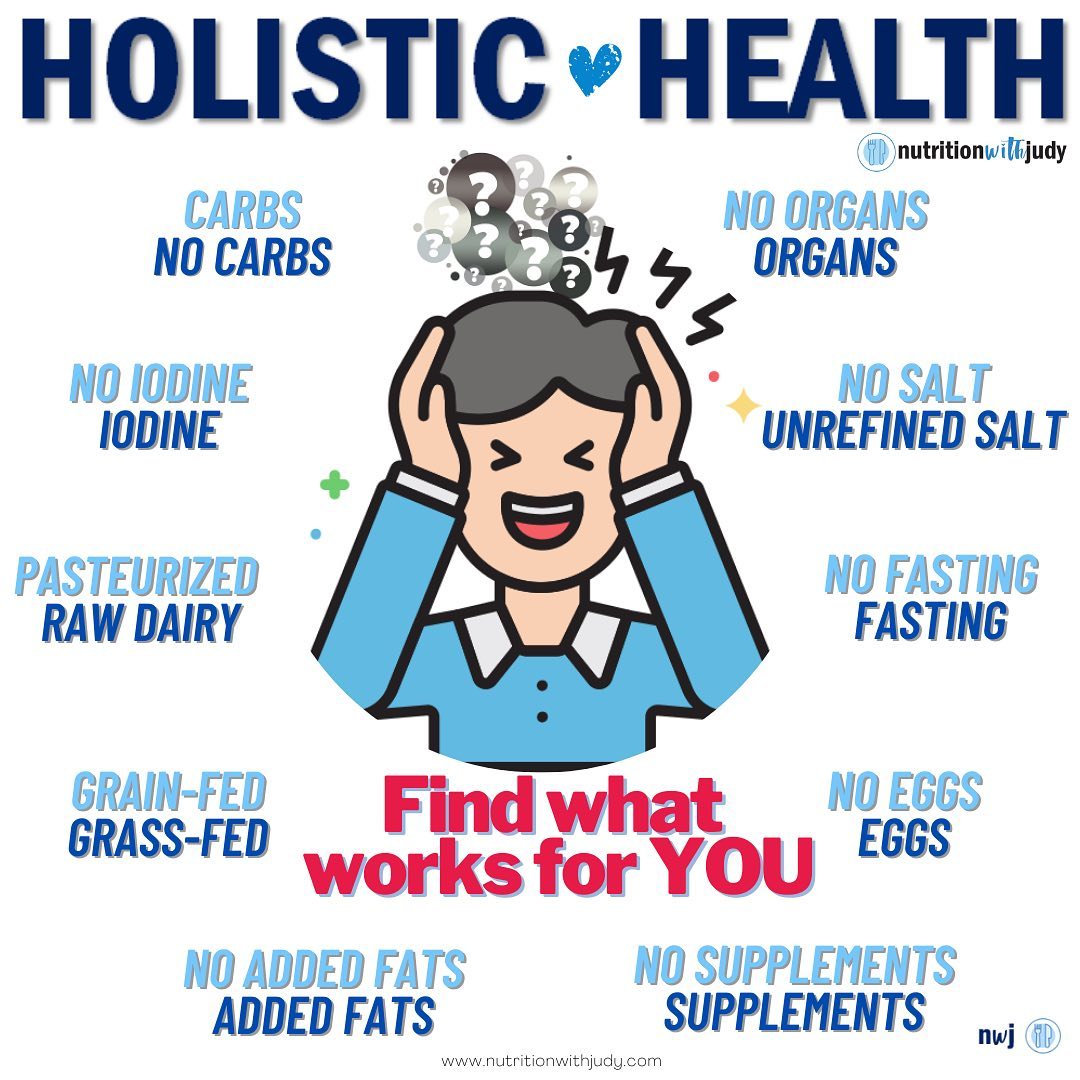

- Holistic Health Approach: The carnivore diet emphasizes the importance of a holistic approach to health. It not only addresses physical well-being through nutrition but also considers mental and emotional health, underscoring the interconnectedness of various aspects of health.
- Customizability for Individual Needs: Recognizing that one size does not fit all in nutrition, the carnivore diet allows for adjustments based on individual health needs and goals. This flexibility makes it a viable option for a wide range of people, from those with specific health conditions to active athletes.
The carnivore diet offers a unique approach to nutrition that can lead to significant health improvements. Its benefits in mental health, autoimmune relief, metabolic health, and overall well-being make it a compelling choice for many seeking an alternative dietary path. However, as with any diet, it’s important to approach it thoughtfully and consider how it aligns with your specific health needs and goals.
Beef-Only Carnivore Diet Snack Ideas
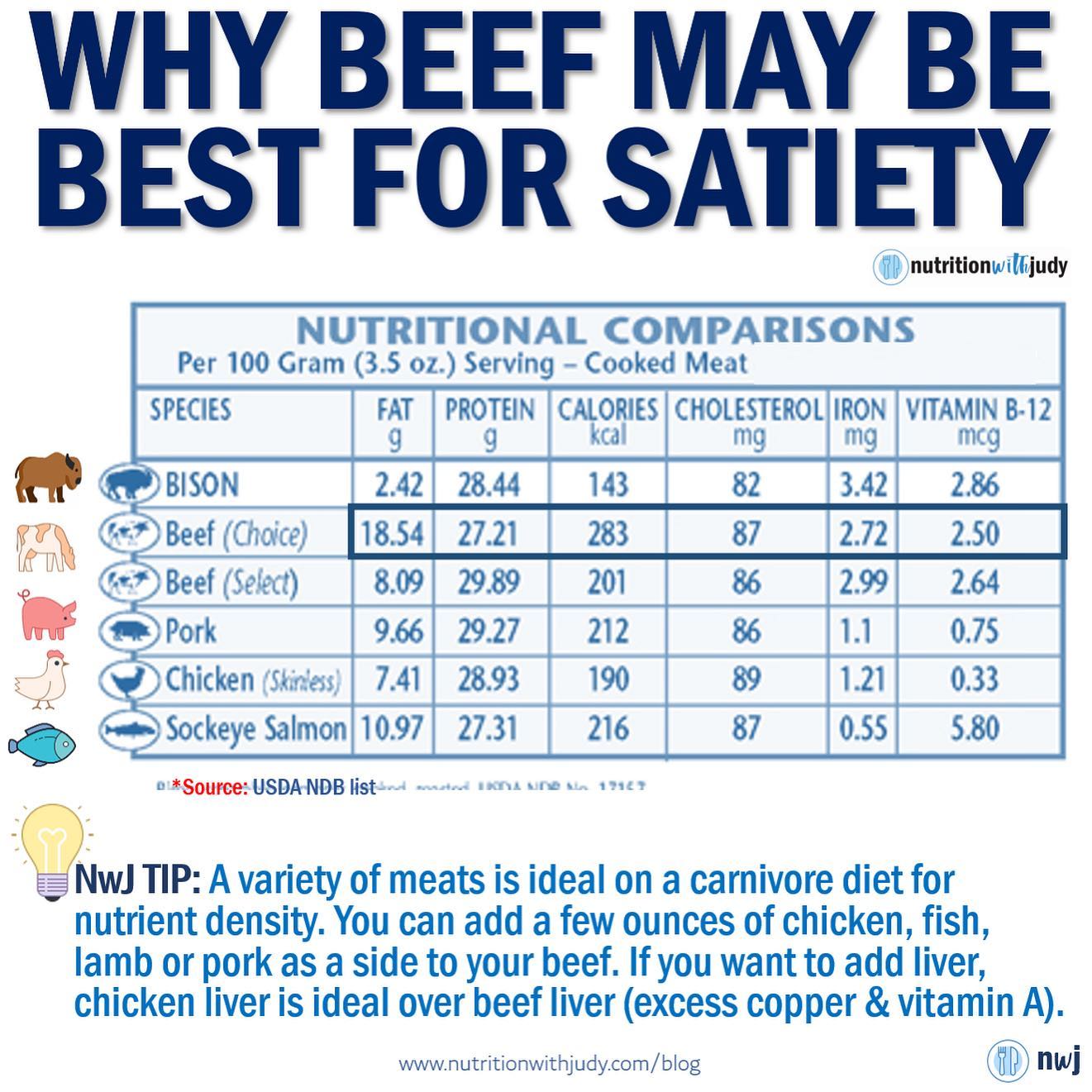

When following a beef-only carnivore diet, snack options might seem limited, but there are still enjoyable and nutritious choices available. Consider these beef-based snacks for a satisfying and diet-friendly treat:
- Carnivore Bars: These are excellent for those on-the-go moments. They pack a savory punch with a pleasing crunch and are high in fat, making them both filling and great for various carnivore diet variations (Use code “NWJ” for 15% off).
- Carnivore Snax: For simple, two-ingredient beef snacks, Carnivore Snax offers a variety of beef-only options. Their meat chips are airier and lighter than conventional jerky (Use code “NWJ” for 15% off your first order).
- Beef Jerky: Opt for versions with minimal added ingredients to stay true to the diet. Jerky is a portable and convenient snack that can be enjoyed anywhere.
- Beef Sticks: Similar to jerky, but often softer in texture, these sticks are another great option for a quick, meaty snack.
- Biltong: A South African dried meat snack that is typically thicker than jerky and includes a variety of spices.
- Beef Liver Chips: For those who want to incorporate organ meats, beef liver chips can be a nutritious and crunchy alternative. Just be mindful not to overconsume liver due to vitamin A toxicity concerns.
- Ground Beef Patties: Mini patties can be prepped in advance and eaten cold or reheated for a quick snack.
- Beef Bone Broth: Although not a traditional ‘snack’, sipping on bone broth can be both satisfying and nourishing, especially on colder days. Take it on the go in a thermos.
- Dried Beef Slices: Thinly sliced and dried beef provides a chewier, jerky-like snack option. You can make your own if you have a dehydrator.
- Beef Bacon: A less common but delicious variant of bacon, offering a different flavor profile for your snacking pleasure.
Each of these beef-centric snacks aligns well with the strict requirements of the beef-only carnivore diet, ensuring adherence without sacrificing taste or convenience.
Lion Diet Snack Ideas
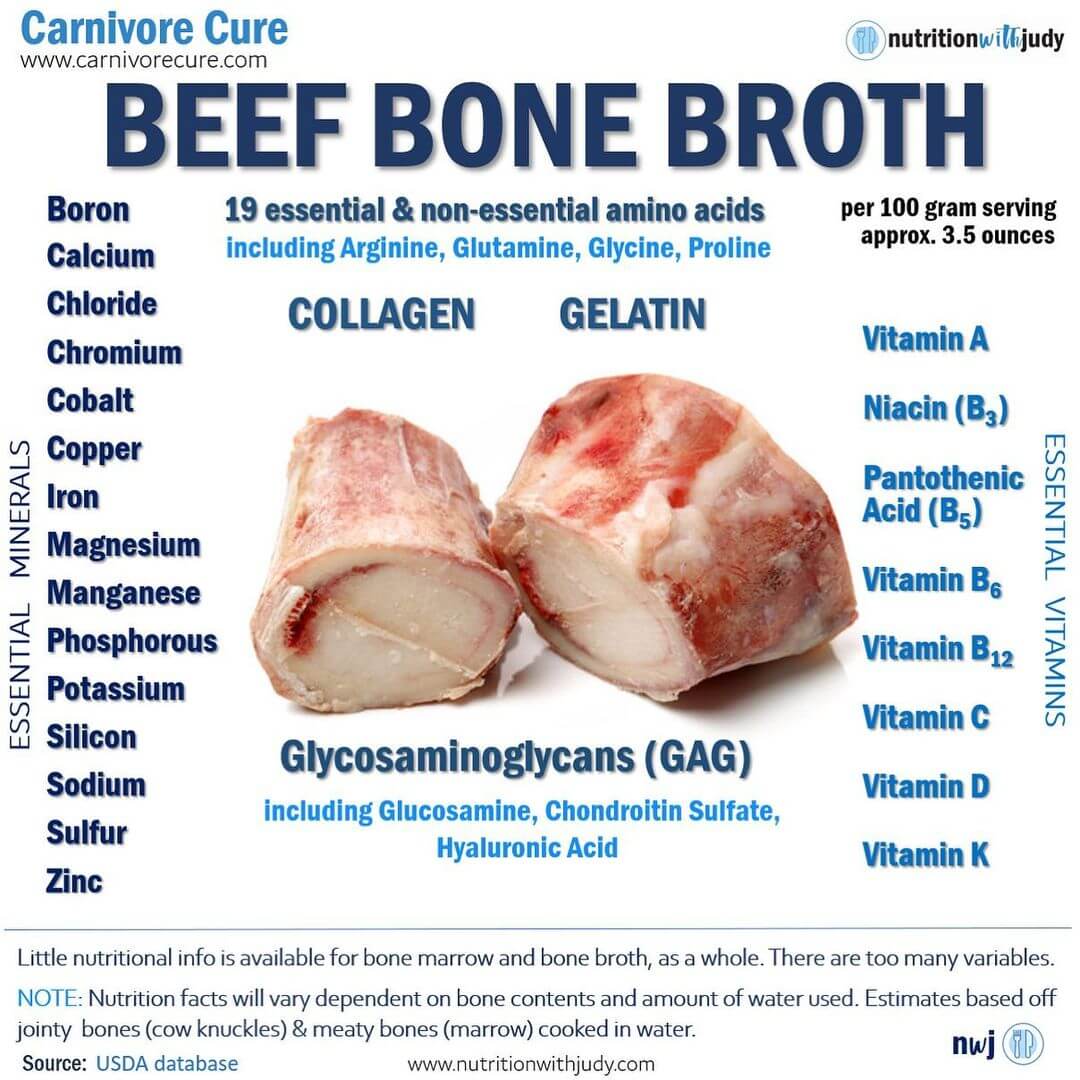

The lion diet, known for its strict adherence to ruminant meats, salt, and water, offers a unique approach to snacking. When considering snack options within this dietary framework, it’s important to focus solely on snacks derived from ruminant animals. Here are some suggestions:
- Dried Ruminant Meats: This includes beef jerky or biltong, made exclusively from ruminant animals such as cows or bison. These snacks are not only tasty but also convenient for on-the-go snacking. Carnivore Bars and Carnivore Snax are some other great options to look into.
- Ruminant Meat Sticks: Similar to jerky, these are made from ground ruminant meats and can be a portable and satisfying option.
- Ruminant Liver Chips: For those interested in incorporating organ meats, liver chips made from ruminant animals can be a nutritious choice.
- Bone Broth: Sipping on bone broth made from ruminant bones is a comforting and nourishing option, especially beneficial for gut health.
- Ruminant Fat Trimmings: Snacking on small portions of fat trimmings from ruminant meats can provide energy and satiety.
- Mini Ruminant Meat Patties: Small, pre-cooked patties can be a practical and quick snack, especially when you’re short on time.
- Ruminant Meatballs: Easy to prepare in advance, meatballs made from ruminant meats can be eaten cold or reheated as a snack.
- Ruminant Tartare: For those who enjoy raw meats, tartare made from ruminant meats can be a gourmet snacking option.
- Ruminant Bone Marrow: Consumed either cooked or raw, bone marrow is a delicacy that’s nutrient-dense and flavorful.
Each of these snacks aligns with the lion diet’s emphasis on ruminant meats, ensuring that you stay within the dietary guidelines while enjoying a variety of tasty options.
Meat-Only Carnivore Diet Snack Ideas
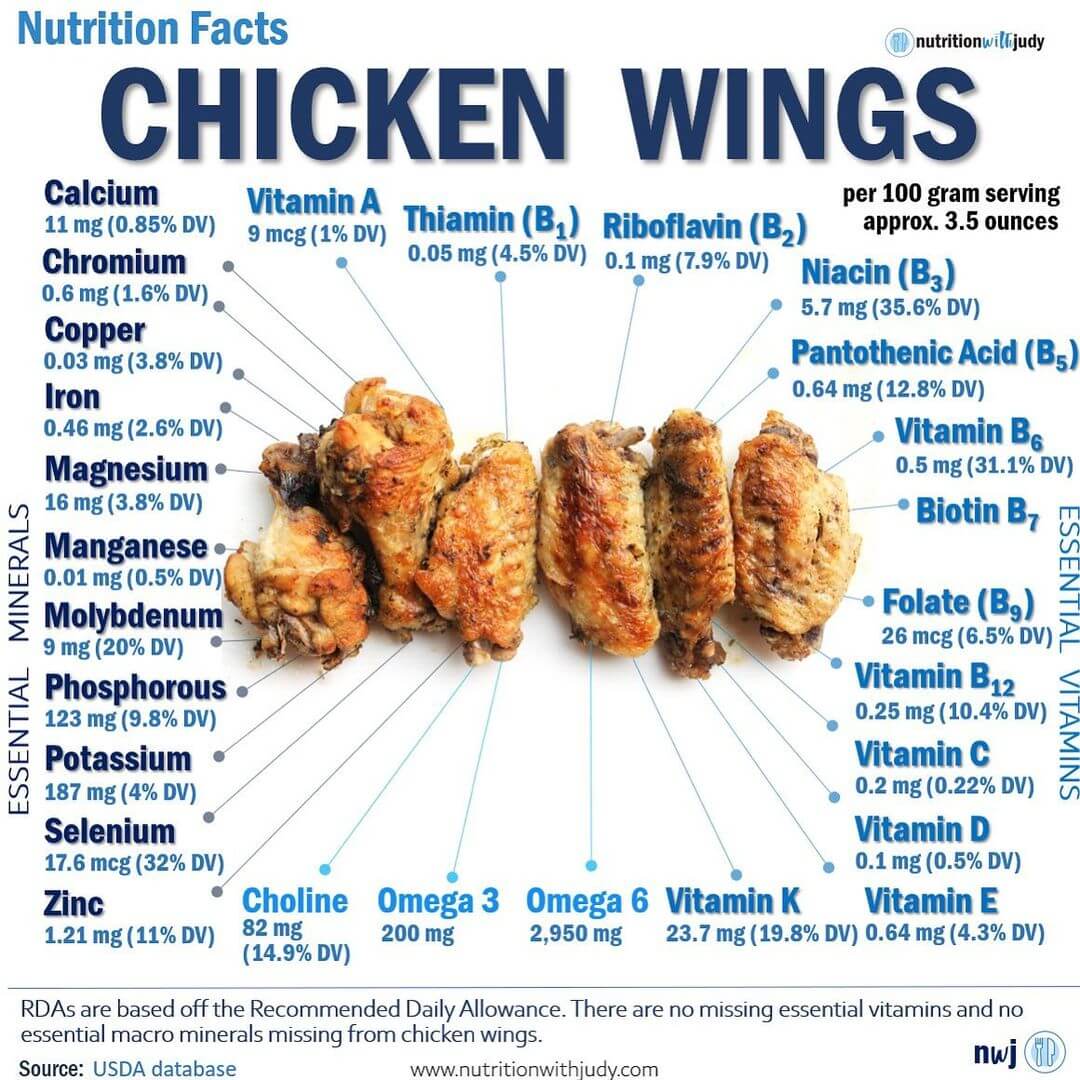

On a meat-only carnivore diet, focusing exclusively on muscle meats from any animal, snack options become both interesting and varied. This dietary approach offers simplicity and nutrient density, making it a popular choice for those looking to streamline their eating habits. Here are some snack ideas that strictly adhere to the meat-only guideline, ensuring compliance and satisfaction:
- Beef Jerky: Opt for homemade or store-bought jerky with minimal seasoning to maintain diet purity. Beef jerky is a convenient and portable protein-rich snack.
- Chicken Strips: Grilled or baked chicken strips can be seasoned lightly with salt and perhaps a touch of herbs to keep things interesting without adding carbs. Carnivore Snax has great chicken options as well if you’d prefer not to cook or dehydrate your own.
- Pork Rinds: Although not technically muscle meat, pork rinds (or cracklings) can be included for their high fat and protein content, offering a crunchy texture that many crave on a carnivore diet.
- Bison Bites: Similar to beef jerky, bison offers a leaner option with a distinct taste, making it a great snack choice for variety.
- Lamb Cubes: Small, bite-sized lamb cubes, either roasted or pan-fried, can provide a rich and satisfying snack or meal addition.
- Turkey Roll-ups: Thinly sliced turkey breast can be rolled up for an easy-to-consume snack. For added flavor, consider wrapping around another piece of meat.
- Carnivore Bars: Some commercially available or homemade carnivore bars focus solely on meat content, providing a blend of ground muscle meat in a convenient form. You can find incredible pemmican recipes online.
- Fish Jerky or Lox: While less common, jerky made from salmon or other fish provides a good source of omega-3 fatty acids and can be a flavorful addition to the carnivore diet snack lineup. Smoked salmon and other lox options can also be great on the go.
Each of these snacks ensures that individuals following a meat-only carnivore diet can enjoy a variety of flavors and textures while sticking to their dietary restrictions. These options are designed to be both nourishing and satisfying, aiding in adherence to the diet without the need for non-animal products.
Zero-Carb Carnivore Diet Snack Ideas
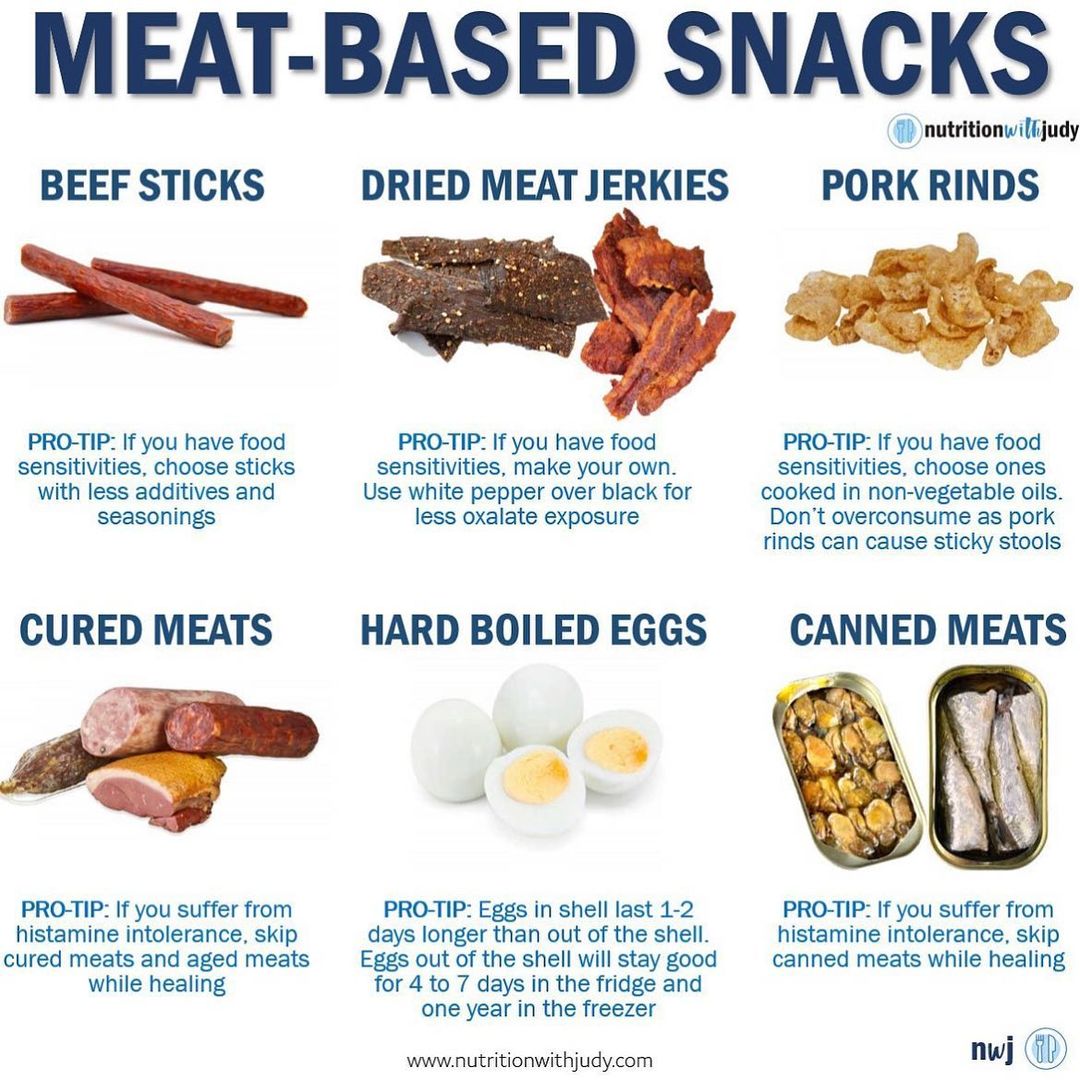

Adhering to a zero-carb carnivore diet focuses on eliminating carbohydrates while prioritizing animal products, including muscle meats, dairy, and eggs. This dietary approach provides a variety of snack options that are both satisfying and compliant with the zero-carb philosophy. Here are some snack recommendations for those following a zero-carb carnivore diet:
- Beef Jerky: Opt for natural, unsweetened beef jerky as a high-protein, portable snack. Ensure it’s made from quality meat without added sugars or carbs.
- Hard-Boiled Eggs: Eggs are a perfect zero-carb snack, packed with protein and healthy fats. They’re easy to prepare in advance and great for snacking on the go.
- Cheese Slices: Full-fat cheeses are excellent for a zero-carb diet. Choose varieties such as cheddar, gouda, or brie for a satisfying snack with minimal to no carbs.
- Pork Rinds: These are a crunchy, satisfying snack that fits well into a zero-carb diet. Look for versions without added flavorings that might contain carbs.
- Sliced Salami: Salami and other cured meats are convenient and delicious zero-carb snacks. Pair with cheese for added variety and flavor.
- Canned Fish: Sardines, mackerel, and tuna are great zero-carb options, offering high-quality protein and omega-3 fatty acids.
- Chicken Wings: Baked or grilled chicken wings (without breading) can be a flavorful, zero-carb snack, especially when seasoned with carb-free spices.
- Beef Sticks: Look for grass-fed beef sticks without added sugar for a simple, meaty snack that’s easy to take anywhere.
- Buttered Coffee: If you drink coffee, you can add butter and/or heavy cream for a quick fuel boost while on the go.
These snack options support the goals of the zero-carb carnivore diet by focusing on high-quality animal products without introducing carbs. They’re designed to satisfy hunger, provide nutrient density, and maintain the dietary restrictions of the zero-carb approach.
Low-Histamine Carnivore Diet Snacks
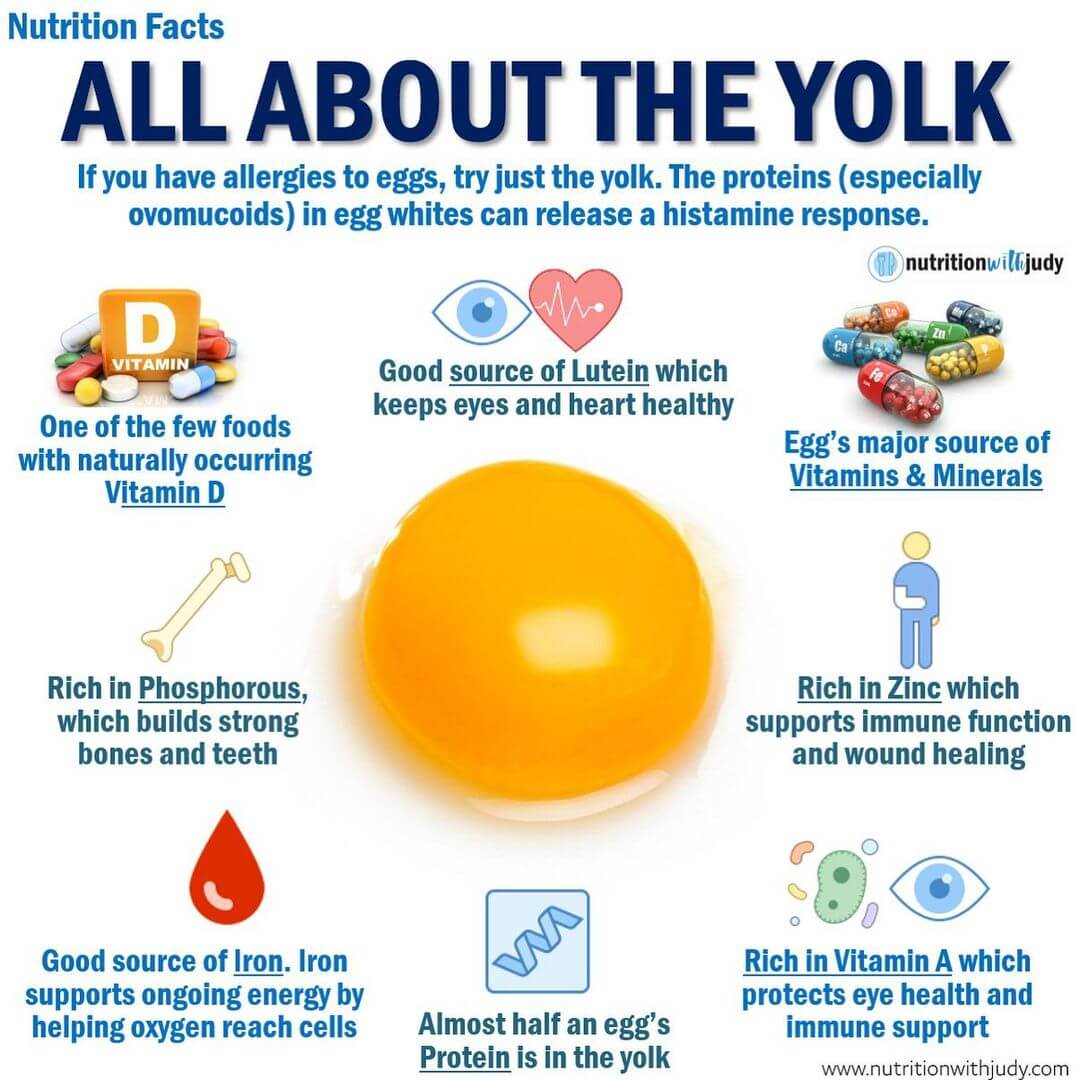

Finding low-histamine snack options on a carnivore diet presents unique challenges, particularly due to the nature of histamine buildup in meats. Histamines begin to accumulate in meat as soon as it is no longer fresh or frozen, which can pose a problem for individuals with histamine intolerance or sensitivity. This condition necessitates careful selection of snacks to minimize histamine exposure.
The key to managing a low-histamine carnivore diet is to prioritize fresh or frozen meat snacks, keeping them frozen until they are ready to be heated and eaten. This approach helps to slow down the histamine buildup, ensuring that the meat remains as low in histamines as possible. Freshly cooked muscle meats from any animal, quickly frozen post-cooking, can be an excellent snack option under this dietary constraint.
Egg yolks and certain dairy products that are known to be low in histamines may also serve as viable snack alternatives. These include fresh, high-quality butter, and some types of cheese that are less aged and known for their lower histamine content. However, it’s important to individualize dairy choices based on personal tolerance levels, as dairy can be histamine-releasing for some individuals.
Conversely, processed and dehydrated meats are typically high in histamines and should be avoided by those adhering to a low-histamine carnivore diet. These include items such as aged cheeses, cured meats, and any meat that has been stored unfrozen for an extended period. Such foods undergo processes that significantly increase their histamine levels, making them unsuitable for individuals looking to manage histamine intake.
Maintaining a low-histamine carnivore diet requires careful selection and preparation of snacks, with a preference for fresh or freshly frozen muscle meats, and the inclusion of specific low-histamine dairy products and egg yolks. Processed and dehydrated meats, along with aged dairy products, must be avoided to keep histamine levels in check.
Tips for Eating Out On the Carnivore Diet
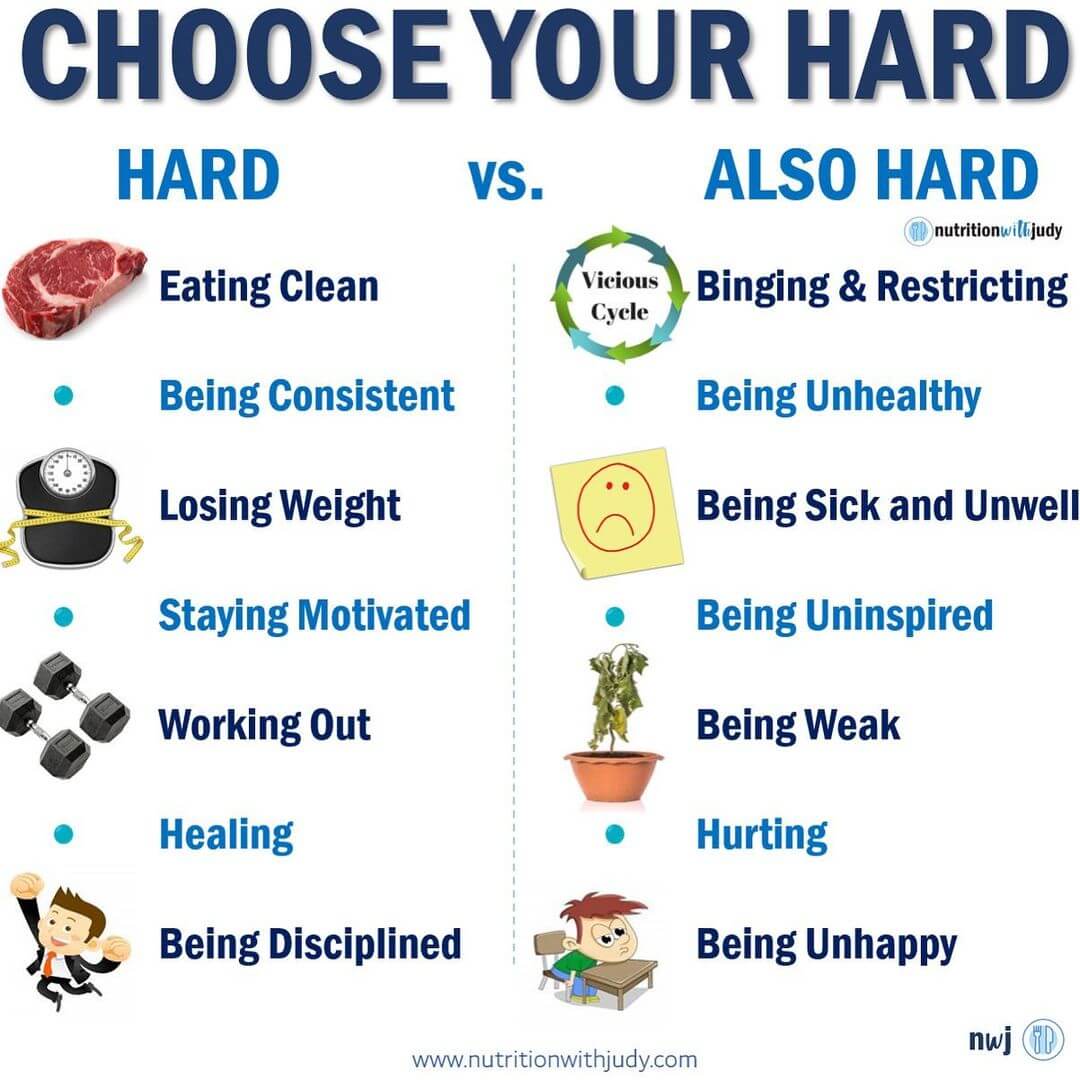

Eating out on a carnivore diet, especially when you’re short on time to prepare snacks, requires a strategic approach to ensure you stay within dietary guidelines. Here are some best practices and tips to make dining out a seamless experience:
- Choose Meat-Centric Restaurants: Opt for steakhouses, barbecue joints, or places known for their meat selections. These venues are more likely to offer options that align with the carnivore diet. Most restaurants serve meat so you can often order sides of meat too.
- Communicate Clearly: When ordering, be clear about your dietary restrictions. Request that your dish be prepared simply — grilled or roasted with no marinades, sauces, or seasonings that might contain hidden carbs or sugars.
- Prioritize Freshness: Select freshly cooked meats over processed or cured options to avoid added ingredients that are not carnivore-friendly.
- Ask for Substitutions: If a meal comes with sides that are not part of the carnivore diet, ask to substitute them with an additional serving of meat or a carnivore-friendly option.
- Consider Pure Dairy: For those who include dairy in their carnivore diet, opt for high-fat, pure dairy products such as butter or certain cheeses, ensuring they are low in lactose and fit within your dietary needs.
- Plan Ahead: If possible, review the restaurant’s menu online before you go to identify the best options and plan your meal ahead of time. This can help avoid last-minute decisions that might not be ideal for your diet.
By following these tips, you can enjoy dining out without straying from your carnivore diet, ensuring you maintain your dietary integrity even when you’re away from home.
Closing Thoughts On Carnivore Diet Snacks
Throughout our exploration of carnivore diet snack ideas, we’ve navigated a variety of dietary approaches within the carnivore spectrum, offering tailored recommendations to suit each specific version of this meat-focused diet. For individuals adhering to a beef-only regimen, options such as carnivore bars and beef jerky provide savory, nutrient-dense choices that align with the diet’s principles. Those following the lion diet, which restricts intake to ruminant meats, can enjoy snacks such as dried ruminant meats and bone broth to stay within dietary guidelines.
For enthusiasts of the nose-to-tail carnivore diet, incorporating organ meats and bone marrow into snacks offers more variety. Meanwhile, individuals on a meat-only carnivore diet have a plethora of muscle meat options, from chicken strips to fish jerky, ensuring a diverse and satisfying snack selection. Zero-carb carnivore dieters can broaden their snack choices to include dairy products and eggs, offering a richer variety of flavors and textures.
Addressing the unique needs of those seeking low-histamine options, we’ve discussed the importance of selecting fresh or frozen meats and avoiding processed meats to minimize histamine intake. Additionally, practical tips for eating out on the carnivore diet emphasize choosing meat-centric venues and communicating dietary preferences clearly to ensure compliance and enjoyment.
It’s great to have these options in the back of your mind for times when you’re traveling, engaged in work events, and whenever you’re out on the go.
Work With Our Trusted Carnivore Diet Functional Nutritional Therapy Practitioners
The Nutrition with Judy practice is honored to be a trusted carnivore diet practitioner support serving clients from around the globe. We’re passionate about helping our clients achieve root-cause healing in order to lead the best quality of life possible that’s nearly symptom-free. Our team is dedicated to educating our community about the incredible benefits of the carnivore diet. We welcome you to explore our free resources and are always available to support you through personalized protocols. Our Symptom Burden Assessment (SBA) is the perfect starting point for discovering your root cause and is required to work with our team— you can learn more in-depth about this powerful tool here.
Start your root-cause healing journey today and contact us any time with any questions or concerns.
DISCLAIMER: This content is for educational purposes only. While we are board-certified in holistic nutrition and are nutritional therapy practitioners, we are not providing medical advice. Whenever you start a new diet or protocol, always consult with your trusted practitioner first.





